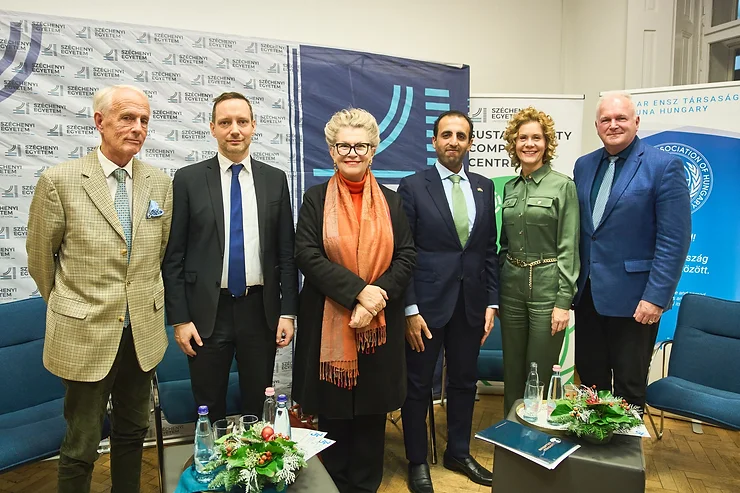Human rights at the centre of panel discussion at Széchenyi István University
The universal value of human dignity was one of the main conclusions of a panel discussion organized by Széchenyi István University at the institution’s Budapest Innovation and Training Centre. The event was prompted by the 75th anniversary of the Universal Declaration of Human Rights this year.
In January of this year, Széchenyi István University launched the panel discussion series titled "Women in the Family, Society, and Science", featuring female role models who demonstrate their professional successes, determination, and significant roles in society on a daily basis. The topics have been closely aligned with the United Nations' Sustainable Development Goal addressing gender equality. This connection was not only due to the importance of the theme, but also because the Győr institution is a member of the United Nations Academic Impact initiative.
The closing session of the year, held on 12 December, followed the reversed protocol of the panel discussion: this time, inspiring male speakers shared their professional and personal perspectives on the occasion of the 75th anniversary of the Universal Declaration of Human Rights. According to the decision of the UN General Assembly in 1950, the day of the adoption of the document, 10 December, serves at the same time as World Human Rights Day. The discussion was moderated by Katalin Bogyay, Ambassador, Hungary's 15th Permanent Representative to the United Nations, former Permanent Delegate to UNESCO, and President of the Hungarian UN Association, who also served as the Chair of the 36th UNESCO General Conference and is the founding director of the Hungarian Cultural Centre in London.

L to R: Dr János Perényi, former Hungarian Ambassador in Vienna, Chairman of the Board of Directors of GYSEV Zrt., Tristan Azbej PhD, Secretary of State for Aid to Persecuted Christians at the Ministry of Foreign Affairs and Trade, Ambassador Katalin Bogyay, H.E. Saud Al Shamsi, Ambassador of the United Arab Emirates to Hungary, Dr Eszter Lukács, Vice President for International Affairs and Strategic Relations at Széchenyi István University and Dr László Szabó, former Hungarian Ambassador in Washington, now Head of the Hungarian Innovation Hub. (Photo: József Bankó)
Katalin Bogyay explained that, in the original formulation of the declaration, the English word "man," in its general meaning of "human," was used, and it required extraordinary perseverance to ensure that the gender-neutral term "persons" was incorporated into the text. She emphasized that the significance of the document is reflected in the fact that it has been translated into 500 languages worldwide.
Dr János Perényi, formerly Hungarian Ambassador in Vienna and Rabat, and now Chairman of the board of directors of GYSEV Zrt., emphasized that the declaration, inspired by the horrors of World War II, represented a novelty in its scientific approach, treating human dignity as a universal value and targeting the entire humanity. "Vision and reality sometimes come into conflict because politics often seeks to override human rights. Therefore, if necessary, the implementation of what is stated in the declaration must be enforced," he stressed.
Dr László Szabó, former Hungarian ambassador in Washington and head of the Hungarian Innovation Hub, drew attention to the fact that even today the document remains extremely modern and accurate. "It's splendid just how many countries have become signatories to it and found answers to fundamental human rights questions," he said. Regarding gender equality, he emphasized that "the key is balance: we must find the strengths of men and women in society and be able to connect them effectively and harmoniously."
Secretary of State for Aid to Persecuted Christians at the Ministry of Foreign Affairs and Trade, dr Tristan Azbej, emphasized that the Universal Declaration of Human Rights, although not religious, is still a text inspired by religion. "The document is about more than human integrity; it is also about human dignity, which we can only fully contextualize when we understand the religiously inspired part: that God created man," he stated. He added that in well-functioning communities, the situation of women is crucial because, on the one hand, they can teach children to respect human dignity and responsibility, and on the other hand, they make the most essential internal decisions affecting families. "The key to development is women's fundamental access to the education system worldwide, which Hungary strongly supports," he emphasized.
H.E. Saud Al Shamsi, Ambassador of the United Arab Emirates to Hungary, highlighted the importance of the role of women. "If we, men and women, cannot effectively collaborate, it's like using only one hemisphere of our brain or running with one eye closed. We know that evil forces who want to control society, attempt to control women. Therefore, the education, empowerment and involvement of women in decision-making processes are particularly important and a cause for peace" he said. Ha also emphasized that every country must find its own path to maintain peace under the guidance of the Declaration, stay true to its values, and resist “redefinitions” and woke interpretations of the norms that lead to chaos and suffering.

The event filled the auditorium of Széchenyi István University’s Budapest Innovation and Training Centre (Photo: József Bankó)
Photo gallery:




















